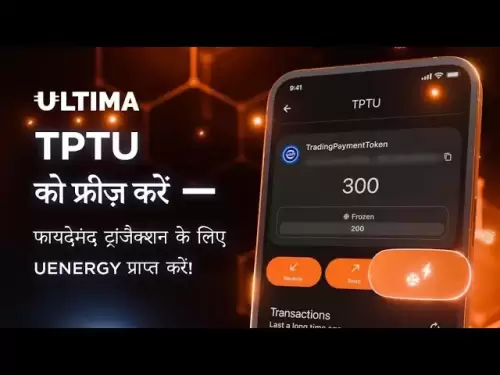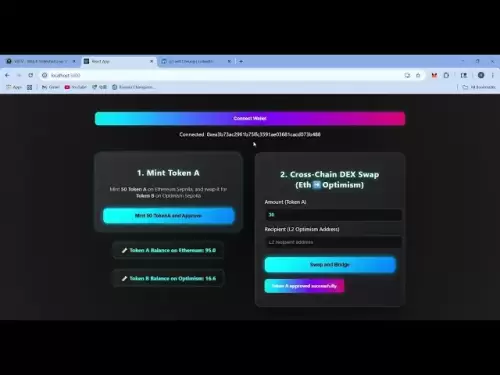-
 Bitcoin
Bitcoin $109,459.7682
2.44% -
 Ethereum
Ethereum $2,598.6052
6.29% -
 Tether USDt
Tether USDt $1.0003
0.00% -
 XRP
XRP $2.2734
3.95% -
 BNB
BNB $661.4886
1.58% -
 Solana
Solana $155.4825
4.35% -
 USDC
USDC $0.9999
-0.02% -
 TRON
TRON $0.2838
1.04% -
 Dogecoin
Dogecoin $0.1740
8.25% -
 Cardano
Cardano $0.6047
9.04% -
 Hyperliquid
Hyperliquid $40.2302
6.50% -
 Sui
Sui $2.9863
10.05% -
 Bitcoin Cash
Bitcoin Cash $509.5786
0.60% -
 Chainlink
Chainlink $13.8156
6.03% -
 UNUS SED LEO
UNUS SED LEO $9.0142
0.69% -
 Avalanche
Avalanche $19.0337
8.68% -
 Stellar
Stellar $0.2438
5.17% -
 Toncoin
Toncoin $2.9012
3.59% -
 Shiba Inu
Shiba Inu $0.0...01210
6.20% -
 Litecoin
Litecoin $90.0882
7.05% -
 Hedera
Hedera $0.1597
8.53% -
 Monero
Monero $326.3340
2.88% -
 Polkadot
Polkadot $3.6365
9.32% -
 Bitget Token
Bitget Token $4.6162
2.72% -
 Dai
Dai $1.0001
0.00% -
 Ethena USDe
Ethena USDe $1.0002
-0.01% -
 Uniswap
Uniswap $7.6403
10.47% -
 Pepe
Pepe $0.0...01060
12.03% -
 Aave
Aave $281.3664
7.56% -
 Pi
Pi $0.4992
1.76%
How to prevent smart contract vulnerabilities in Ethereum wallets?
Preventing Ethereum smart contract vulnerabilities requires thorough auditing, secure coding practices, using reputable contracts, and regularly updating wallet software. Diversifying assets and awareness of phishing scams are also crucial for robust security.
Mar 16, 2025 at 06:20 am
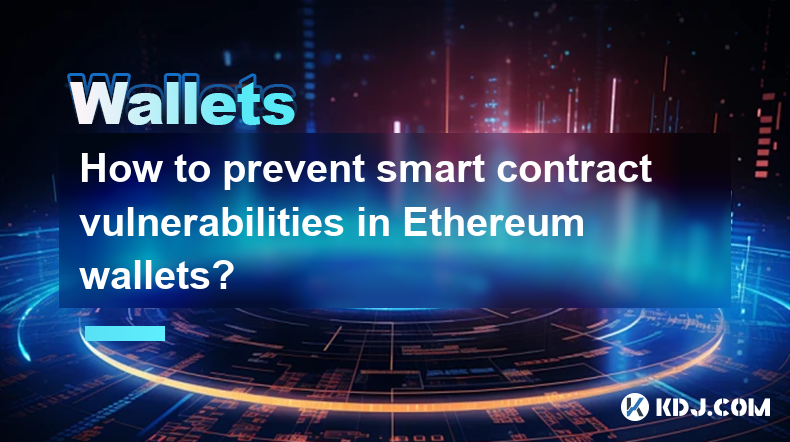
Key Points:
- Understanding common smart contract vulnerabilities is crucial for prevention.
- Thorough auditing and code reviews are essential before deployment.
- Utilizing reputable and well-tested smart contracts minimizes risk.
- Employing secure coding practices during development is paramount.
- Regularly updating your wallet software and firmware enhances security.
- Educating yourself about phishing scams and social engineering tactics is vital.
- Diversifying your assets across multiple wallets mitigates potential losses.
How to Prevent Smart Contract Vulnerabilities in Ethereum Wallets
Smart contracts, self-executing contracts with the terms of the agreement between buyer and seller being directly written into lines of code, are a cornerstone of the Ethereum blockchain. However, vulnerabilities in these contracts can expose users to significant financial risks. Preventing these vulnerabilities requires a multi-faceted approach encompassing both pre- and post-deployment strategies.
Understanding Smart Contract Vulnerabilities
Before diving into prevention, understanding the common vulnerabilities is crucial. These include reentrancy attacks, where a malicious contract can repeatedly call a function to drain funds, and overflow/underflow errors, which can occur when mathematical operations exceed the limits of data types. Other common vulnerabilities include denial-of-service attacks, which can render a contract unusable, and logic errors that can lead to unintended consequences.
Pre-Deployment Security Measures
The most effective way to prevent vulnerabilities is to avoid them in the first place. This begins with meticulous development practices.
- Formal Verification: Employ formal methods to mathematically prove the correctness of the smart contract's logic. This is a rigorous process but offers a high degree of assurance.
- Thorough Auditing: Engage independent security auditors specializing in smart contract analysis. They will scrutinize the code for potential vulnerabilities and provide recommendations for improvements.
- Code Reviews: Conduct thorough peer reviews of the code by experienced developers. Multiple sets of eyes can catch errors that might be missed by a single individual.
- Use Established Libraries and Frameworks: Leverage well-tested and widely used libraries and frameworks whenever possible. These have often undergone extensive scrutiny, reducing the likelihood of introducing new vulnerabilities.
- Secure Coding Practices: Adhere to secure coding guidelines specifically designed for Solidity, the primary language used for Ethereum smart contracts. This includes proper input validation and output sanitization.
Post-Deployment Security Practices
Even after deployment, maintaining the security of your smart contract is ongoing.
- Bug Bounties: Offer bug bounties to incentivize security researchers to identify and report vulnerabilities. This proactive approach can quickly address potential problems.
- Monitoring and Alerting: Implement monitoring systems to track the contract's activity and receive alerts for suspicious behavior. This can help detect and respond to attacks in real-time.
- Regular Updates: If vulnerabilities are discovered, promptly release updates to patch them. Communicate these updates clearly to users.
- Insurance: Consider purchasing smart contract insurance to mitigate potential losses resulting from exploits.
Wallet Security Beyond Smart Contracts
While focusing on smart contract security is paramount, broader wallet security practices are equally crucial.
- Strong Passwords and Seed Phrases: Use strong, unique passwords and securely store your seed phrase. Never share this information with anyone.
- Software Updates: Keep your wallet software and firmware up-to-date to benefit from the latest security patches.
- Phishing Awareness: Be aware of phishing scams and social engineering tactics. Never click on suspicious links or reveal your private keys.
- Hardware Wallets: Consider using a hardware wallet for enhanced security. These store your private keys offline, making them less vulnerable to hacking.
- Diversification: Don't keep all your funds in a single wallet or contract. Diversify your holdings across multiple wallets to limit potential losses from a single exploit.
Frequently Asked Questions
Q: What are the most common types of smart contract vulnerabilities?
A: Reentrancy attacks, overflow/underflow errors, denial-of-service attacks, and logic errors are among the most prevalent vulnerabilities.
Q: How can I find a reputable smart contract auditor?
A: Research firms with proven experience and positive reviews from the community. Look for auditors with certifications and a clear methodology.
Q: Are there any tools to help identify smart contract vulnerabilities?
A: Yes, several static and dynamic analysis tools are available to help identify potential vulnerabilities in smart contracts. Many are open-source and free to use.
Q: What should I do if I suspect my smart contract has been compromised?
A: Immediately suspend any further transactions. Contact a security expert and potentially law enforcement if necessary.
Q: How can I protect myself from phishing scams related to smart contracts?
A: Be cautious of unsolicited emails or messages. Verify the legitimacy of any website or communication before providing any sensitive information. Never click on links from untrusted sources.
Disclaimer:info@kdj.com
The information provided is not trading advice. kdj.com does not assume any responsibility for any investments made based on the information provided in this article. Cryptocurrencies are highly volatile and it is highly recommended that you invest with caution after thorough research!
If you believe that the content used on this website infringes your copyright, please contact us immediately (info@kdj.com) and we will delete it promptly.
- Altcoin Alert: Binance Listings and the Wild West of Crypto
- 2025-07-03 14:30:11
- Decentralized Stablecoins in 2025: Challenging Centralized Counterparts?
- 2025-07-03 14:30:11
- Meme Coin Mania: Is BTC Bull the Next Big Thing in a Limited Time BTC Bull Run?
- 2025-07-03 12:30:11
- Bitcoin Soars to $109,000: What's Fueling the Crypto Rally?
- 2025-07-03 10:30:13
- Hong Kong: Racing to Be the World's Tokenization Hub
- 2025-07-03 14:50:11
- Splatterhouse Rocks Retro Scene: A UK Magazine Deep Dive
- 2025-07-03 12:30:11
Related knowledge

How to lock my Phantom wallet extension?
Jul 03,2025 at 11:14am
What Is the Phantom Wallet and Why Lock It?The Phantom wallet is a popular non-custodial cryptocurrency wallet designed for interacting with the Solana blockchain. Supporting both browser extensions and mobile apps, Phantom allows users to store, send, receive, and stake SOL tokens, as well as interact with decentralized applications (dApps). Securing y...

Does Phantom wallet offer two-factor authentication (2FA)?
Jul 03,2025 at 09:00am
Understanding Phantom Wallet and Its Security FeaturesPhantom wallet is a widely used non-custodial cryptocurrency wallet that supports the Solana blockchain. It allows users to store, send, receive, and interact with decentralized applications (dApps) seamlessly. As security is a top priority for any crypto wallet user, security features like two-facto...

What is "rent" on Solana and how does it affect my Phantom wallet?
Jul 02,2025 at 08:35pm
Understanding 'Rent' on SolanaIn the context of Solana, the term 'rent' refers to a storage fee that users pay for maintaining data on the blockchain. Unlike Ethereum, where storage costs are paid once via gas fees during contract deployment, Solana implements a recurring cost model to ensure efficient usage of network resources. This means that any acc...
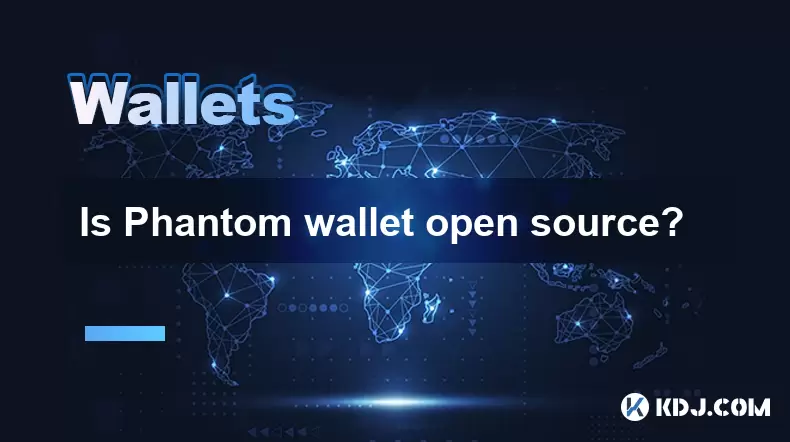
Is Phantom wallet open source?
Jul 03,2025 at 12:29am
What is Phantom Wallet?Phantom wallet is a non-custodial cryptocurrency wallet primarily designed for the Solana blockchain. It allows users to store, send, receive, and interact with decentralized applications (dApps) on the Solana network. The wallet is available as a browser extension and mobile application, offering a seamless experience for both be...
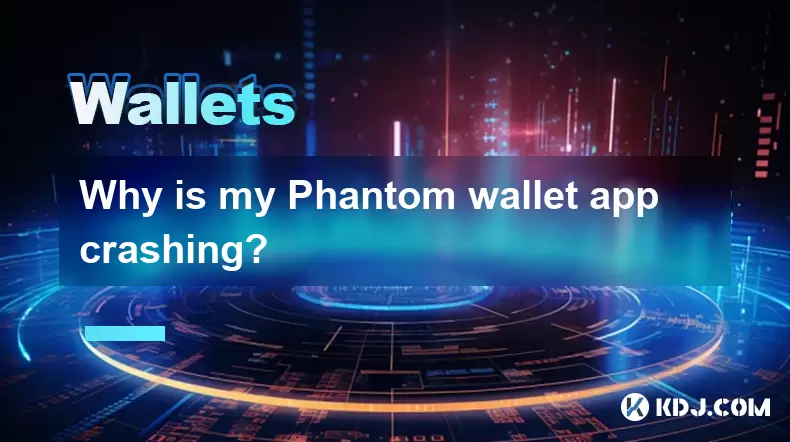
Why is my Phantom wallet app crashing?
Jul 02,2025 at 07:35pm
Understanding Phantom Wallet App CrashesIf you're experiencing issues with the Phantom wallet app crashing, you're not alone. Many users have reported similar problems, especially during high network activity or after recent updates. Phantom is a popular Solana-based wallet that allows users to store, send, and receive SOL tokens as well as interact wit...
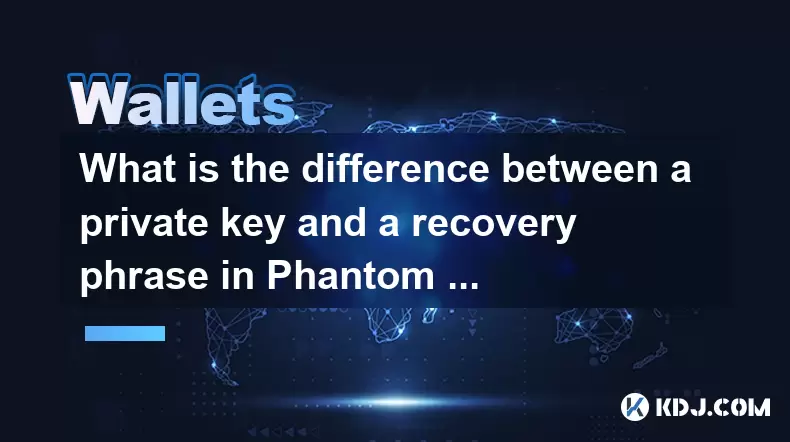
What is the difference between a private key and a recovery phrase in Phantom wallet?
Jul 02,2025 at 09:57am
Understanding the Basics of Phantom WalletPhantom wallet is a non-custodial digital wallet primarily used for interacting with the Solana blockchain. It allows users to store, send, and receive SOL tokens and other digital assets like NFTs. Non-custodial means that the user retains full control over their private keys and recovery phrases. Understanding...

How to lock my Phantom wallet extension?
Jul 03,2025 at 11:14am
What Is the Phantom Wallet and Why Lock It?The Phantom wallet is a popular non-custodial cryptocurrency wallet designed for interacting with the Solana blockchain. Supporting both browser extensions and mobile apps, Phantom allows users to store, send, receive, and stake SOL tokens, as well as interact with decentralized applications (dApps). Securing y...

Does Phantom wallet offer two-factor authentication (2FA)?
Jul 03,2025 at 09:00am
Understanding Phantom Wallet and Its Security FeaturesPhantom wallet is a widely used non-custodial cryptocurrency wallet that supports the Solana blockchain. It allows users to store, send, receive, and interact with decentralized applications (dApps) seamlessly. As security is a top priority for any crypto wallet user, security features like two-facto...

What is "rent" on Solana and how does it affect my Phantom wallet?
Jul 02,2025 at 08:35pm
Understanding 'Rent' on SolanaIn the context of Solana, the term 'rent' refers to a storage fee that users pay for maintaining data on the blockchain. Unlike Ethereum, where storage costs are paid once via gas fees during contract deployment, Solana implements a recurring cost model to ensure efficient usage of network resources. This means that any acc...

Is Phantom wallet open source?
Jul 03,2025 at 12:29am
What is Phantom Wallet?Phantom wallet is a non-custodial cryptocurrency wallet primarily designed for the Solana blockchain. It allows users to store, send, receive, and interact with decentralized applications (dApps) on the Solana network. The wallet is available as a browser extension and mobile application, offering a seamless experience for both be...

Why is my Phantom wallet app crashing?
Jul 02,2025 at 07:35pm
Understanding Phantom Wallet App CrashesIf you're experiencing issues with the Phantom wallet app crashing, you're not alone. Many users have reported similar problems, especially during high network activity or after recent updates. Phantom is a popular Solana-based wallet that allows users to store, send, and receive SOL tokens as well as interact wit...

What is the difference between a private key and a recovery phrase in Phantom wallet?
Jul 02,2025 at 09:57am
Understanding the Basics of Phantom WalletPhantom wallet is a non-custodial digital wallet primarily used for interacting with the Solana blockchain. It allows users to store, send, and receive SOL tokens and other digital assets like NFTs. Non-custodial means that the user retains full control over their private keys and recovery phrases. Understanding...
See all articles





















